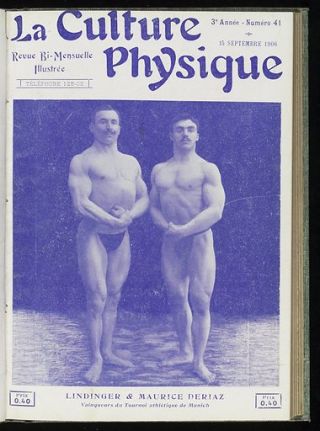Body Image
What’s Wrong With Having the Perfect Body?
Harmful body image concerns in men are increasing due to media representation.
Posted January 18, 2023 Reviewed by Vanessa Lancaster
Key points
- Movies and social media are full of images of the "perfect" human body, female and male.
- Beliefs about the desirability of bulking up with muscle can warp the understanding of oneself or create a body image disorder.
- Men are often reluctant to talk about the issue of body image disorder, so it's important to learn helpful ways to approach the topic.

Going to a big-budget studio movie these days often means taking in relentless depictions of the idealized human form. Fit, slim young people dominate the screen, no matter where you look. And superhero films, with muscular characters wearing skin-tight outfits, express this principle to an extreme.
What you might not have noticed, though, are the changes in these glamorized bodies over the last few years–in particular, for male stars.
In movies in which the male physique is on display, the standards for musculature have become more and more extreme, departing further and further from the body of the average man. Think of Hugh Jackman, who has played the superhero Wolverine since 2000; his physique has become increasingly massive and lean over the past few decades. Even now, Jackman is working on his next appearance as Wolverine, promising to be “bigger than ever.”
Social media reflects this change, too, possibly marking a trend: Instagram is clogged with “thirst trap” selfies featuring muscular men with minimal body fat percentage. According to Lonergan et al. (2021) in "Social Media and Eating and Body Image Concerns Among Men and Boys," posts like these receive a disproportionately positive response from other social media users, reinforcing the men who post this way.
A 2020 quantitative analysis of photos posted by men on Instagram, carried out by Gültzow et al., found the same thing: Most of the photo posts in the sample depicted prominent musculature and lean body mass. To measure the perceived male need to be muscular, D. R. McCreary created a psychometric scale measuring "drive for muscularity” in 2017, noting that the no-body-fat physique, packed with muscles, is often “considered the male ideal.”
According to Luciano (2007), contemporary American men grow up believing that muscles are synonymous with masculinity. These distorted expectations do more than just contribute to a proliferation of shirtless photos on social media. Such beliefs and attitudes can also warp the understanding of oneself or create the body image disorder known as muscle dysmorphia, a condition in which sufferers become irretrievably convinced that their bodies are too small, too skinny, or too weak.
Social media seems to be contributing to this and other body-image disorders, too: as McCreary (2017) stated, research shows that men feel worse about their physical appearance after taking in the kind of idealized, hyper-muscular imagery typically found on Instagram. As they do in women, body-image concerns can reduce men’s self-esteem, confidence, and overall life satisfaction (Cafri et al., 2002).
The problem only gets worse when you look at younger men. A 2019 study of 7000 male Americans between 18 and 24 revealed that more than one in five had a disordered relationship to food caused by their desire to be bigger and more muscle-bound. These young men are likely to eat too much (because “bulking up” requires a high-calorie intake), take dietary supplements like extra protein, or even put their health at risk by using anabolic steroids.
Effects like these are not limited to the US: While up to 40 percent of American men are anxious about their weight (Frederick et al., 2022), as many as 30 percent of men in England feel the same way. According to the U.K.’s Mental Health Foundation survey, more than 20 percent of English men admitted that they had tried to dress in a way that concealed parts of their bodies in 2019; 11 percent of the Englishmen surveyed reported suicidal thoughts attributable to negative body image concerns, and 4 percent said they had already tried to hurt themselves for this reason. And up to 85 percent of men in France aren’t happy with their bodies, either, believing they are insufficiently muscular, according to the Journal of Men’s Health (2014).
Over the course of the COVID-19 pandemic, health-related anxieties may have worsened the body-image issues experienced by many men. A 2021 study found that the stresses caused by social distancing during the pandemic were linked to higher male dissatisfaction with their weight and muscles.
Many men are reluctant to talk about these problems with their families or friends, as Räisänen and Hunt noted in a 2014 article in the BMJ Open journal. Because they feel insufficiently “big” and equate size with masculinity, they may remain silent out of fear that expressing these feelings would make them seem even less manly. And even if they raise these issues, Räisänen and Hunt said, some may not be taken seriously because body-image concerns are often seen as something pertaining to women. For this reason, knowing what to look for when identifying body image concerns in men may be helpful.
If you become aware that a friend or family member has suddenly gained a lot of weight, has bulked up excessively, has been talking far too much about his body, or is spending an unusual amount of time at the gym in front of the mirror, consider the possibility that a body-image issue is present.
Your friend may also turn inward, focusing on weightlifting and diet, and neglecting relationships. If this is the case, try to help them seek out a therapist with expertise in eating disorders. He’ll may need to work to reframe obsessive thoughts about physical appearance and to reorient their health goals to focus less on their exterior benefit and more on their effects on long-term well-being.
References
Barlett, C. P., Vowels, C. L. & Saucier, D. A. (2008). Meta-analyses of the effects of media images on men's body-image concerns. Journal of Social and Clinical Psychology 27(3).
Cafri, G., Strauss J. & Thompson, J. K. (2002). Male body image: Satisfaction and its relationship to well-being using the somatomorphic matrix. International Journal of Men's Health; 1 (2)
Frederick, D. A., Crerand, C. E., Brown, T. A., Perez, M., Best, C. R., Cook-Cottone, C. P., Compte, E. J., Convertino, L., Gordon, A. R., Malcarne, V. L., Nagata, J. M., Parent, M. C., Pennesi, J., Pila, E., Rodgers, R. F., Schaefer, L. M., Thompson, J. K., Tylka, T. L., & Murray, S. B. (2022). Demographic predictors of body image satisfaction: The U.S. Body Project I, Body Image, Volume 41, 17-31.
Gültzow, T., Guidry, J. P. D., Schneider, F. & Hoving, C. (2020). Male body image portrayals on Instagram. Cyberpsychology, Behavior, and Social Networking. 23(5), 281-289.
Lonergan, A.R., Mitchison, D., Bussey, K. & Fardouly, J. (2021). Social Media and Eating and Body Image Concerns Among Men and Boys. In J. M. Nagata, T. A. Brown, S. B. Murray & J. M. Lavender (Ed.), Eating disorders in boys and men, pp/ 307-316. Cham, Switzerland: Springer.
Luciano, L. (2007). Muscularity and Masculinity in the United States: A Historical Overview. In J. K. Thompson & G. Cafri (Eds.), The muscular ideal: Psychological, social, and medical perspectives (pp. 41–65). American Psychological Association. https://doi.org/10.1037/11581-002
McCreary, D. R. (2007). The Drive for Muscularity Scale: Description, Psychometrics, and Research Findings. In J. K. Thompson & G. Cafri (Eds.), The muscular ideal: Psychological, social, and medical perspectives (pp. 87–106). American Psychological Association. https://doi.org/10.1037/11581-004
The Mental Health Foundation. (2019, Nov 12). Millions of men in the UK affected by body image issues – Mental Health Foundation survey. Retrieved from https://www.mentalhealth.org.uk/about-us/news/millions-men-uk-affected-body-image-issues-mental-health-foundation-survey
Räisänen, U. & Hunt, K. (2014). The role of gendered constructions of eating disorders in delayed help-seeking in men: a qualitative interview study. Retrieved from https://bmjopen.bmj.com/content/bmjopen/4/4/e004342.full.pdf
Swami, V., Horne, G. & Furnham, A. (2021, Feb 15). COVID-19-related stress and anxiety are associated with negative body image in adults from the United Kingdom. Personality and Individual Differences, 170.
Valls, M., Bonvin, P., & Chabrol, H. (2014). Association between muscularity dissatisfaction and body dissatisfaction among normal-weight French men. Journal of Men's Health, 10(4), 139-145.




